|
|
|
Sort Order |
|
|
|
Items / Page
|
|
|
|
|
|
|
| Srl | Item |
| 1 |
ID:
126723
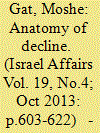

|
|
|
|
|
| Publication |
2013.
|
| Summary/Abstract |
Following the Suez Campaign the British government found itself facing Moscow and its bid for power in the Middle East. The Soviets, for their part, exploited London's weakness to extend and consolidate their influence in the Arab world. By taking advantage of the Arab-Israeli conflict, by maintaining an (un)reasonably high level of regional tension, Moscow sought to make the Arabs totally dependent on its support. It began supplying the Arabs with weapons and providing them with diplomatic support, acquiring in the process a regional status equal to that enjoyed by the West. This in turn meant that any attempt by Britain to come to some kind of an understanding, such as limiting arms sales to the Middle East, had virtually no chance of success. Having mobilized what little remained of its power to try and check the Soviet advance, Britain was finally forced admit that it was no longer up to the task.
|
|
|
|
|
|
|
|
|
|
|
|
|
|
|
|
| 2 |
ID:
126726
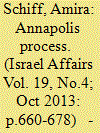

|
|
|
|
|
| Publication |
2013.
|
| Summary/Abstract |
The analysis indicates three sets of factors through which parties' willingness to achieve a consensual solution can be assessed: the contextual factors that contribute to adversaries' decision to proceed to official negotiations, the functions of the pre-negotiations and the changes that occur in the parties' perceptions during the pre-negotiations. A simultaneous exploration of these factors provides a more complete assessment of the parties' intentions and their willingness to proceed to negotiations directed at a win-win solution. This, in turn, enables a better understanding of the factors that undermine de-escalation initiatives, not only between Israel and the Palestinians but in other intractable conflicts as well.
|
|
|
|
|
|
|
|
|
|
|
|
|
|
|
|
| 3 |
ID:
126732


|
|
|
|
|
| Publication |
2013.
|
| Summary/Abstract |
There is an issue which often emerges whenever nearing an election campaign - the fear of an 'election year economics' and the damage it brings. The fear is that the government will implement policies aimed at 'benefiting the people' in order to win re-election, such as increasing public expenditures, introducing tax cuts, raising salaries, etc. These actions, however, benefit the people only in the short term. Over the long run they may cause great damage as they force governments to borrow or print money, or to choose another route, of tax increases or government budget cuts, to be applied soon after the elections. Both options demonstrate how election economics can be seen as something akin to a 'bribe' given to voters, which damages not only the economy, but the entire political culture as well. Thus, it is interesting to examine whether there is an election economy in Israel. The article covers the three decades from 1982 to 2010. The findings show that during this period, the use of election economics in Israel decreased, and that in recent campaigns it seems to have completely disappeared.
|
|
|
|
|
|
|
|
|
|
|
|
|
|
|
|
| 4 |
ID:
126725
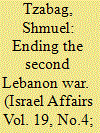

|
|
|
|
|
| Publication |
2013.
|
| Summary/Abstract |
The termination of the Second Lebanon War (2006) is among the most unusual in wars between Israel and Arab states. A classic example of an asymmetrical confrontation between a sovereign state and a guerrilla organization controlling part of a neighbouring state and operating against its will by means of terrorism, the war had far-reaching ramifications for Israeli decision makers in terms of defining the enemy and setting the termination goals of the conflict. In this respect great significance is attributed to the influence of the interface between the military and political echelons on formulating the war's termination strategy, especially in light of the high status enjoyed by the military in Israeli democracy.
|
|
|
|
|
|
|
|
|
|
|
|
|
|
|
|
| 5 |
ID:
126724
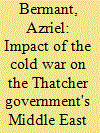

|
|
|
|
|
| Publication |
2013.
|
| Summary/Abstract |
This article argues that Margaret Thatcher's concern over Soviet ambitions was a highly significant factor behind the general agreement between 10 Downing Street and the Foreign Office (FCO) on the Middle East during the 1980s. Notwithstanding her instinctive understanding for the State of Israel, Thatcher increasingly perceived Israeli policies as a liability rather than an asset for Western interests, in view of worries that they were increasing instability in the region, and therefore undermining the security of Britain's Arab allies. Thatcher feared that the Soviets and other radical forces would exploit regional turmoil in order to expand their influence in the Middle East. Therefore, she agreed with the FCO on the urgent need to resolve the Israeli-Palestinian conflict as a means of defusing regional tensions at a time of heightened cold war friction.
|
|
|
|
|
|
|
|
|
|
|
|
|
|
|
|
| 6 |
ID:
126730
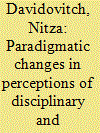

|
|
|
|
|
| Publication |
2013.
|
| Summary/Abstract |
The Israeli academic world has not yet determined its attitude to multidisciplinary approaches, which leads to a lack of institutionalization and regulation in research and in curricular development. The fashion in the 1990s has become a fact, yet the challenge persists: academic institutions offer their students multidisciplinary programmes, considered to be less prestigious, while at the same time displaying scepticism of multidisciplinary research and scholars working in diverse areas of knowledge. The world outside academe has already endorsed multidisciplinary approaches; academe itself is still trying to have its cake and eat it too.
|
|
|
|
|
|
|
|
|
|
|
|
|
|
|
|
| 7 |
ID:
126729
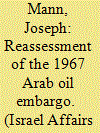

|
|
|
|
|
| Publication |
2013.
|
| Summary/Abstract |
The 1967 war had more influence on the Arab-Israeli conflict than any other factor, and yet the Arab states did not make use of their most efficient weapon. Most of the research on the Six Day War which has touched on the oil embargo blames the embargo's failure on the lack of Arab unity rather than on the inability to set oil policies. Indeed, many researchers believe that the disagreements within the Arab world before the war prevented the oil-producing states from cooperating with their counterparts, such Egypt and Syria, that took part in the war against Israel, and that the embargo therefore did not stand a chance of succeeding. This article seeks to refute the received wisdom that the 1967 oil embargo was a failure because of the lack of Arab unity. By contrast, the success of the 1973 oil embargo was not, as is widely argued, due to Arab unity but to the nature of the oil market at the time.
|
|
|
|
|
|
|
|
|
|
|
|
|
|
|
|
| 8 |
ID:
126728
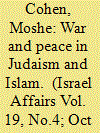

|
|
|
|
|
| Publication |
2013.
|
| Summary/Abstract |
This article examines traditional Jewish and Islamic attitudes towards war and peace. Both religions have always maintained a balance between the destruction of the old order and the creation of the new one. Yet today's prevailing interpretations of Islam seem to question this balance as evidenced inter alia by the rise in acts of violence over the past decades which largely emanates from a fundamentalist interpretation of the Qur'an and associated Muslim scriptures (Sunna, Hadith).
|
|
|
|
|
|
|
|
|
|
|
|
|
|
|
|
|
|
|
|
|